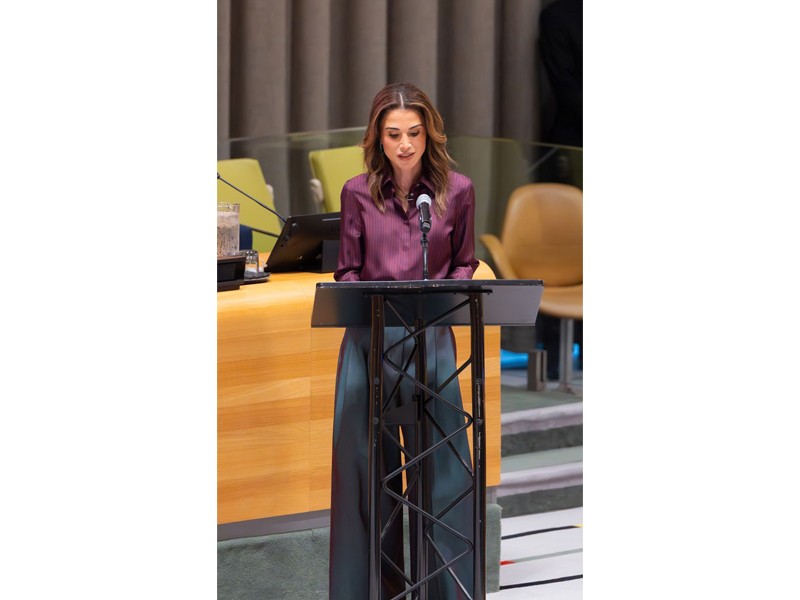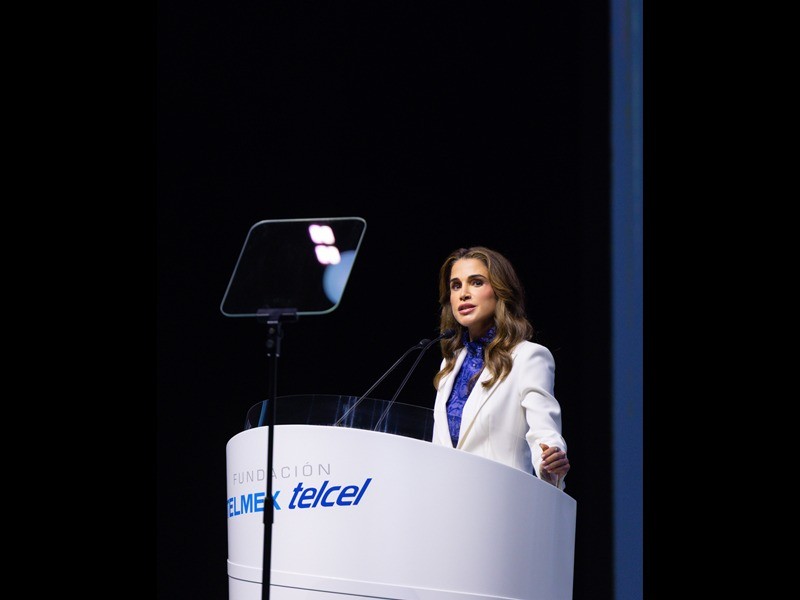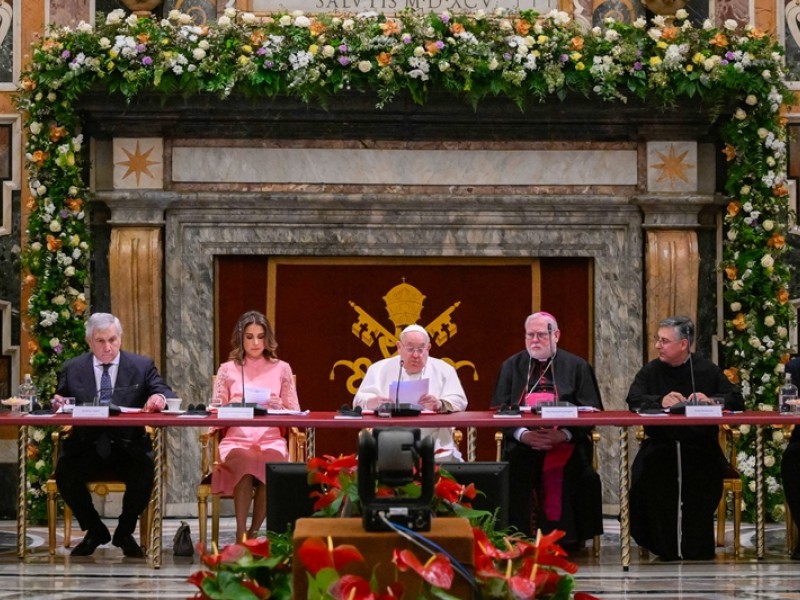Queen Rania’s Acceptance Speech for the Gold Medal of the Italian President of the Republic - Rimini, Italy

Your Excellency Minister Gasparri,
Deputy Mayor Melucci,
Mr. Picco,
Your Excellencies,
Distinguished Guests,
Ladies and Gentlemen,
Thank you Mr. Cucuzza for your kind introduction, and I thank you all and the Centre for this great honor. The President’s Gold Medal is a tribute to the ideals we share – ideals that are so important today – community, among all the world’s people, and a commitment to global dialogue.
This conference takes its theme from a Norse legend, that of Heimdall’s Horn. In myth, the Horn was blown to call the whole Earth together, to act against danger – and that image very much describes the kind of work that is being done here today.
Indeed, in the legends, Heimdall’s Horn was so powerful that it could be heard throughout all the nine worlds of Norse creation. Today, we don’t need to shout across nine worlds to hear each other…or do we? The Western World, the Arab World, the Developed and Developing Worlds…all the many ways we divide our globe… In fact, we certainly must speak out, and sometimes speak out boldly, if we are to reach each other and make a difference.
Today, I’d like to take my theme from another part of the Heimdall legend. Because Heimdall was more than the “signalman.” He was the watcher. His senses were so keen, the story goes, that he could hear wool grow on a sheep, or see the smallest twitch in the grass, a hundred leagues away.
Listening and seeing: To me, this represents our most difficult challenge. To hear the voices of the world’s people, including the powerless and the oppressed…to understand their rightful claims for a future of hope…and then, to respond, with timely and effective action.
In the past few years, I have traveled and met with people all over the world. And in the past year, I’ve heard a new commitment on all sides to respect each other, and to tackle our problems together. I am proud to have been able to speak out, to help send a message about the Arab World’s commitment to peace, tolerance and equality, and our respect for diversity. In turn, I have heard worldwide hope about the new Century’s promise, and belief in our ability to work in fellowship to advance the cause of peace.
These are bedrock values, on which we can build a strong future. Yet if we listen, we will hear other truths as well – truths we must confront if we are to make any progress in creating a better world.
First, is that inequity endangers the promise of our age.
No one here can doubt that we live at a time of unprecedented achievement--and potential. The 21st Century has opened new horizons for development. But it cannot be sustained, until all humanity has access to the promise.
Tonight, as you sit down to dinner, consider: Three billion of the world’s people live on less than $2 a day.
When you power on your computer, consider: Almost two billion people do not even have access to electricity.
The next time you put your child to bed, consider: This year, 11 million young children will die because of poverty, conflict, and poor environments.
The world’s inequities contribute to what I’ve called the hope gap – the gulf that separates the world’s people into those who see a future for themselves, and those who do not.
The hope gap opens when people must struggle just to survive, and children are denied what they need to thrive and learn.
The hope gap widens when communities are left behind, held back by scarce resources, a lack of technology, and yesterday’s educations.
And when entire nations and regions are bypassed by global economic growth…the hope gap becomes a chasm.
This hope gap has serious consequences for all of us. Because inequity is not just an issue for the have-nots. It’s an issue for the haves as well.
And this leads me to a second truth we can hear, if we listen to the people of the world. It is that injustice is the thief of peace.
Today, too many people, especially youth, are alienated from our era’s promise. Youth without futures are all too vulnerable to those who teach hate and division. Conflict and instability undermine the foundations of productive society. And so today’s failures are carried into the future, and across the world.
To defend our weakest…to raise our poorest…is a moral obligation, and more: it is a recognition of our common economic and political fate. I think of UN General Secretary Kofi Annan, and his wise words: “Today, no walls can separate humanitarian or human rights crises in one part of the world from national security crises in another.”
So we must listen, and we must act. It is up to us to make the promise real.
In fact, our era provides significant tools for making a difference. We have innovative new development strategies that respond to new, global realities. Worldwide communications and mobility make it possible to work together as never before. New, public-private partnerships let us combine the strengths of government, business, and NGOs.
I work with humanitarian organizations that have discovered the power of a global approach. In child development, in protecting abused children and families, in opening doors for women…we are demanding that action be relevant to the countries and communities in need. The information flow is not one-way or even two-way; it is multi-directional and constant.
All this reflects one overriding fact: today, real “globalization” means interdependence – a serious dialogue involving all people. The 21st Century does not belong to any one culture or region. It is ours to create, in harmony.
This interdependence brings new challenges, but it also offers new hope. This conference itself is evidence of that. Like Heimdall’s Horn, it calls us together, because we all have responsibility for the future.
In Jordan, we are acting on that responsibility to create a better life for our people – as His Majesty King Abdullah always says, not just for tomorrow’s generations, but for today’s as well. We have taken risks to advance the cause of peace. We have opened new access to technology, innovation, and enterprise. We have already succeeded, I believe, in setting a standard for our region – laying the groundwork for a modern, strong, and inclusive civil society. And our work will continue.
But no country can succeed in isolation. Our nation, like yours…like all…is part of an indivisible, global environment – an environment shaped by the realities of peace or conflict, poverty or prosperity, everywhere in the world. Together, we share the destiny of our new Century. But even more important: together, we create it.
So let us listen to each other, and work together. Let us envision a future of genuine community, and make it real. And let us never lose the sense of urgency this important work demands.
I join you in sending my best wishes for a speedy recovery for Mr. Roberto Valducci.
Again, I thank you for this great honor. I wish you much success in your meetings today.
موقع جلالة الملكة رانيا العبدالله الرسمي
هذا الموقع الإلكتروني لا يدعم متصفحات الإنترنت القديمة. الرجاء تحديث متصفح الإنترنت إلى نسخة أحدث من إنترنت إكسبلورر 9
متصفح الإنترنت الذي تستخدمه قديم. لتحسين مستوى الأمان عند تصفح مواقع الإنترنت و مشاهدتها بالشكل الصحيح و بفعالية افضل قم بتحديث متصفح الإنترنت الخاص بك



